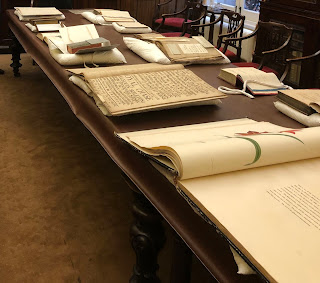On Thursday 7th November I had the pleasure of joining a tour of the Liverpool Athenaeum Library, organised by CILIP North West and the Library and Information History Group. I am a newly qualified librarian with an interest in historic and rare book collections. I’ve worked for the National Trust and am currently in my first professional post as a Local Studies Librarian. So when I saw the tour advertised on the CILIP website I immediately signed up. I suggested it to my manager as an opportunity for networking and CPD, and she readily agreed.
Stepping inside the Athenaeum’s plush interior from the torrents of rain falling outside was like stepping into another world, something out of a Sherlock Holmes story. I could just imagine Holmes, Watson and Mycroft discussing a case in the Newsroom next to a log fire.
Our group was met by Joan, the Librarian at the Athenaeum since 2007. Her enthusiasm for her role and the collection was evident. This is an Honorarium post, and together with a small group of volunteers, Joan puts on events for the club’s members and proprietors, curates display cases, gives tours, as well as manage the library, or which there are over 60,000 items, built over the years by purchases and donations from members. As well as books, the library contains material associated with Liverpool, the records of the club, and pictures, maps, journals and periodicals.
We were welcomed with a cup of tea as Joan explained the history of the club and the library housed here. Inspired by the Newcastle Literary and Philosophical Society (which I have also visited and highly recommend!) the founding members of the Athenaeum saw there was a demand for such an institution in Liverpool. The club and its library were founded in 1797, and the library is now the largest in Liverpool remaining in private hands. Joan showed us facsimiles of the shareholders books, showing how shares in the club passed hands over the years, and a great resource for research.
Next, we saw some of the treasures of the club, and not just of the literary kind. We heard the story of Arachne, challenging Athena to a weaving contest and being turned into a spider, told in a painting by Edward Halliday.
After a visit to the stacks (which cover two floors, one of which is glass, to allow for improved lighting when it was first built), Joan had prepared some of the books in the Committee Room for us to inspect closer. For me, having studied natural history and biological sciences at university, the highlight was seeing a beautifully illustrated book of plants.
The books Joan had chosen showed us the variety of this collection, from a first edition of Ulysses to a treatise on the blood, inflammation and gunshot wounds by John Hunter, to seeing an inscription by Florence Nightingale, a horn book, and the Roscoe Collection (Mr Roscoe was a local businessman and anti-slavery campaigner).
Since taking on my role as a Local Studies Librarian three months ago, it’s been great meeting others in the profession, and today was no exception (and I got to catch up with someone I had studied my PgDip with too!) I spend quite a bit of my time cataloguing and classifying books and pamphlets, so I am always interested to see how other libraries are organised. In particular, I am interested in the balance between conservation and accessibility with these older books, stemming from my National Trust days, and still pertinent now. In our local studies collection, we have rare and fragile books that must be stored and handled appropriately, but at the Athenaeum members are able to request any book from the Librarian, be it one from the 16th century or from 20 years ago. The books are still being used there in the way they were always intended, and are part of the story and atmosphere of the club.
Heather is the Local Studies Librarian at Cheshire Archives.




Comments
Post a Comment